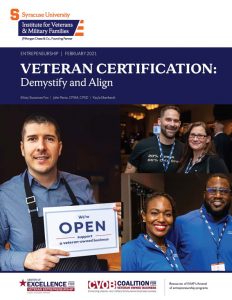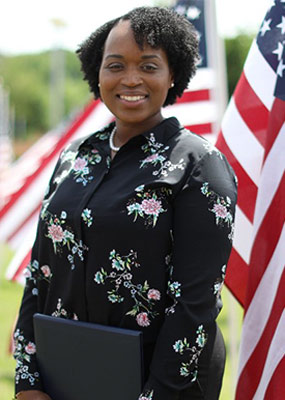Veteran Certification: Demystify and Align
Executive Summary
Authors: Misty Stutsman Fox | John Perez, CPSM, CPSD | Kayla Eberhardt
The Institute for Veterans and Military Families (IVMF) at Syracuse University, has worked to increase the number of procurement-ready veteran-owned businesses (VOBs), while simultaneously working with corporations to build and expand upon their veteran business procurement strategies. In 2016, IVMF partnered with Fiserv to create the CVOB in an effort to further this work. Fortune 1000 corporations have written veterans into their supplier diversity strategies because of the immense benefits veteran-owned businesses provide to the corporation. According to a study by the Hackett Group, “up to 10 percent of sales come with supplier diversity requirements, suggesting that the lack of such program can even result in lost revenue.” While both corporations and VOBs benefit from working together, the onerous certification process creates barriers that hinder both sides from doing business together.
According to the National Survey of Military Affiliated Entrepreneurs, 55% of VOBs listed veteran certification as being difficult and a barrier. The growth potential offered by private contracting opportunities very appealing to VOBs, thus making the argument that a synchronized veteran-owned certification process will aid in the success of veteran business growth.
Unlike other diverse groups that are served by one generally accepted certification, such as Women’s Business Enterprise National Council (WBENC), National LGBT Chamber of Commerce (NGLCC), and National Minority Supplier Development Council (NMSDC), there is no single certifying body or certifying process for corporations to identify verified veteran-owned and operated firms. In addition to varying state certifications and the option to self-certify, there are three private and one federal organization that offer veteran-specific business certification(s). The current state of veteran business certification divides the marketplace and puts pressure on both VOBs and corporations to multiply the time and money spent to make the needed procurement connections.
A generally accepted certification process for VOBs would be efficient and effective for corporations to connect, track, and report on veteran-owned business spend. In addition, it would allow more opportunities for VOBs to serve corporate supply chain needs. The duplicity adds confusion, cost, and is time consuming for VOBs to enter private sector supply chains.
We all have the same goal of providing opportunities for VOB growth and sustainability. To accomplish, we need a streamlined VOB certification process that will require certifying bodies, corporations, and veteran services organizations to work together. The IVMF and CVOB want to demystify and help streamline the process by advocating for the establishment of either one nationally recognized certification, or a unified verification process where all certifying bodies work together towards a reciprocal solution. This will enable corporations to utilize the unified process in their supplier diversity policies.



